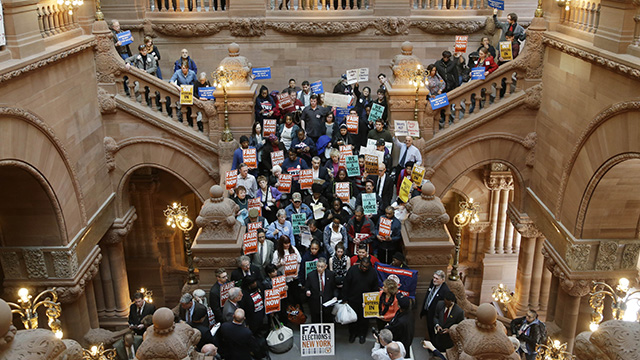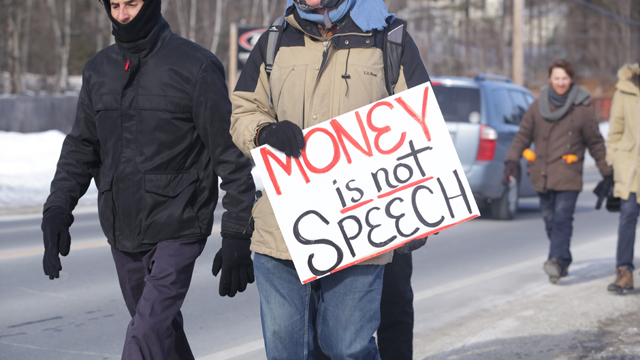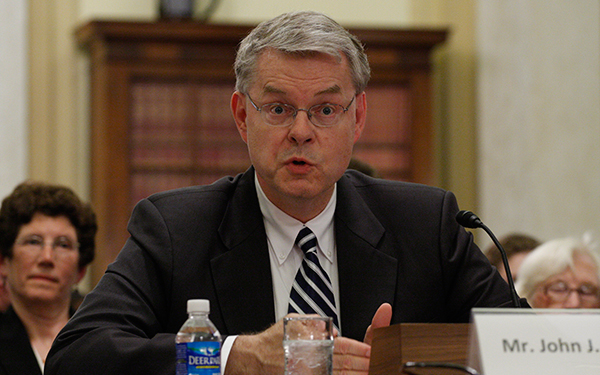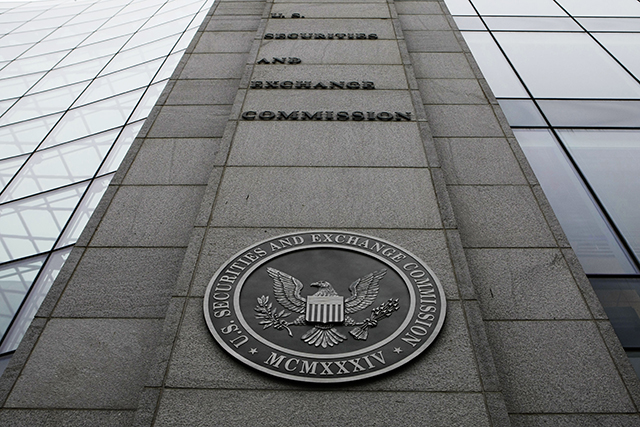In the wake of our most expensive midterm elections ever, decided with the lowest turnout in over 70 years, it’s no wonder that a majority of Americans are fed up with the way big money is distorting our politics.
In the battle for the Senate, 42 extremely wealthy donors accounted for nearly a third of all super PAC spending. Whatever one’s political philosophy may be, the fact is: wealthy donors are now able to drown out your voice.
But if there was a silver lining in the elections’ display of plutocratic might, it’s that there’s growing awareness of how a flood of money is distorting our politics. And watchdogs at Open Secrets, The Campaign Legal Center, Common Cause, The Sunlight Foundation, Democracy 21, Public Citizen and countless other organizations have been working to turn back the tide. Here are some of the campaigns they’re working on that you can get involved in to get money out of politics.
1) AMEND THE CONSTITUTION
The movement for an amendment to overturn Citizens United has quickly gone from pipe dream to mainstream, says Public Citizen’s Rachel Lewis. Since the Citizens United ruling, over 300 cities, towns and counties have passed resolutions, as have 16 state legislatures. And President Obama has voiced his support.
Take Action
At the Move to Amend website, you can follow their barnstorming tours, and latest campaigns. You can also sign onto “Democracy is for People” — Public Citizen’s campaign to pass a constitutional amendment.
2) AMERICAN ANTI-CORRUPTION ACT
Represent.us is a left-right coalition working on a broad, new anti-corruption law that would place limits on lobbying, political donations and PACs. The group’s members are a self-described “special sauce of brains and brawn who really don’t like corruption,” including former FEC chairman Trevor Potter, Rootstrikers director Lawrence Lessig and director Josh Silver. Their plan is to get a million Americans behind their bill before they introduce it and to ask every member of the House to go on the record for or against the American Anti-Corruption Act. If they’re for it, they’re “anti-corrupt.”
You can signal your support for the legislation as a “citizen sponsor.”

Supporters for fair elections in New York rally on the Million Dollar Staircase at the Capitol on Tuesday, March 11, 2014, in Albany, NY. (AP Photo/Mike Groll)
3) GRASSROOTS AND PUBLIC FINANCING
Most of the organizations we surveyed support some combination of grassroots contributions and public financing of elections. Common Cause highlights the Fair Elections Now Act, which would give candidates the option of public financing if they raise a large number of small contributions from their local communities.
Public Citizen sees possibility in a bill called the Grassroots Democracy Act, first introduced in 2012 by Rep. John Sarbanes (D-MD), which would match grassroots contributions of $100 or less with public funds. Shortly after Sarbanes defeated a Republican challenger earlier this month, he told reporters that he will reintroduce the bill in 2015.
And if you’re looking to do something fun and creative, check out Ben (of Ben & Jerry’s) Cohen’s StampStampede.org website. Their campaign involves stamping money with clever messages like “not to be used for bribing politicians.” They also have a Tumblr where you can upload pictures of money that you come across that’s been stamped. They’ve already sold over 11,000 stamp kits (at cost) and given out over 5,000.

A sign at the recent #NHRebellion march in which activist Lawrence Lessig and many others walked across the state to kick off a campaign to get big money out of politics.
4) NH REBELLION
In the tradition of Granny D, an activist who in 1999, at the age of 88, walked from Los Angeles to DC wearing a sign that said “campaign finance reform,” this group of New Hampshire citizens led by Rootstrikers founder Lawrence Lessig kicked off their campaign in January with a 185-mile march across the state. They hope to put an end to what they see as a legal system of corruption in our democracy by asking every candidate at every presidential event between now and the 2016 primary one question: “How will YOU end this system of corruption in Washington?”
By asking this question again and again in their rallies and via the Internet — and by encouraging Americans across the country to join them — they hope to make campaign finance reform the central issue of the 2016 campaign. Their next walk will be in January 2015. Visit NHRebellion.org to learn more and get involved.
5) SEC REGULATION
The Securities and Exchange Commission has the power to issue a rule requiring publicly traded corporations to disclose their political spending. According to Ian Vandewalker of the Brennan Center for Justice, last year the SEC was “poised to consider a petition for rulemaking submitted by 10 experts in corporate and securities law, asking the agency to require publicly traded companies to disclose their political spending.”
The issue fell off of the agency’s 2014 agenda, but activists hope that grassroots pressure they applied earlier this year — over one million people requested the SEC make corporate campaign contributions more transparent over the summer — can lead to SEC consideration in 2015.
Take Action
You can petition the SEC to take this step via Public Citizen or Common Cause. Both groups are members of the Corporate Reform Coalition.

John Sullivan, nominated to the Federal Election Commission by President Obama, testifies in Washington at his confirmation hearing in June 2009. He passed through his hearing with unanimous bipartisan support, but was never confirmed. After 15 months, Sullivan asked the White House to withdraw his nomination. (AP Photo/Harry Hamburg)
6) FEC REGULATION
President Obama made strengthening the FEC one of his 2008 campaign talking points, but his only appointment to the commission during his first term failed to clear the Senate. Through the entire 2011-2012 election cycle, the Federal Election Commission was in deadlock. As interest groups poured billions into the election system, five of the six commissioners were beyond the expiration date on their term in office, and the three Republican commissioners refused to enforce campaign finance laws on ideological grounds. At the end of October 2013, two new appointments took their seats, and they have had their work cut out for them. The FEC is the agency best positioned to regulate and police how moneyed interests spend on elections.
In January, the FEC came under fire from campaign finance reformers after it ended an investigation into Karl Rove’s Crossroads GPS. The original complaint, filed by watchdog groups Public Citizen and Protect Our Elections, claimed that Crossroads had registered as a “social welfare” nonprofit, but had been operating as a political committee or super PAC, and therefore should be forced to disclose its donor list. The Washington Post reported that FEC commissioners decided to dismiss the complaint when they deadlocked in a 3-3 vote to pursue the allegations.

Goldman Sachs is one of the many major companies that hold one or more federal contracts. (AP Photo/Richard Drew)
7) EXECUTIVE ORDERS
In 2011, the White House considered a draft of an executive order that could go a long way toward reining in undisclosed “dark money.” It would require any company that held contracts with the federal government to make its political spending public. As journalist Paul Blumenthal noted at the time, “the order would cover a huge swath of the country’s companies. JPMorgan Chase, Exxon Mobil, General Electric, and the Koch Industries all hold government contracts. Thirty-three of the 41 companies listed in the top 100 campaign contributors over the past two decades are recipients of federal contracts.”
The following year, under intense pressure from the Chamber of Commerce, the White House backed away from the idea. But having gone through a 2014 midterm cycle that was dominated by dark money — disproportionately on the side of Republican candidates — the Obama administration could see the issue differently, especially if they see grassroots pressure to do so. You can contact the White House and let them know what you think about the idea.
8) MONEY-BOMBS
Lawrence Lessig asks us to “embrace the irony” of building a “super PAC to end all super PACs.” His Mayday PAC raised $10 million for the 2014 midterms. Lessig’s group has come under some criticism for the candidates it chose to endorse this year, but as he told BillMoyers.com in April, the midterm elections were a test-run for the organization. He hoped to learn from these races how to most effectively make campaign finance reform a central issue — or the central issue — in the 2016 presidential election. You can get more info, or get involved at Mayday.us.
While Lessig’s group is working outside the traditional DC establishment for the most part, two prominent campaign reform groups with a bevy of political heavy hitters from both parties merged to become Issue One, which funds various reform campaigns and provides long-term strategic planning for the reform movement. Issue One tailors its messaging for the left and the right, highlighting the fact that whether you’re concerned about global warming or free markets, tackling special interest money is… issue one. Find out more at IssueOne.org.





